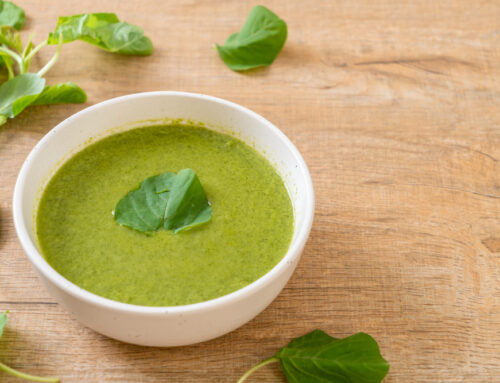By Dr. Angelina Riopel
As we move from autumn to winter and approach the holiday season, it is a great time to pause and cleanse (not detox), in order to clean up our diets and recharge.
Detoxing is a very popular practice right now, but it can do more harm than good if it is too aggressive and done at the wrong time of year. In my practice, I have seen many people become more run down, exhausted or sick from doing an aggressive detox at the wrong time. An aggressive detox, with excessive raw food and cold juice, should be avoided in the cold months, as it is very disruptive to the natural flow of energy at this time.
Traditional Chinese Medicine (TCM) lends wisdom to the energetics behind what to eat and when. In TCM eating with the seasons is encouraged in order to support the energy flow of nature, which is reflected within us. When we go against the natural flow, it can lead to an imbalance of energy and we can experience fatigue, illness and an imbalance of emotions.
Since the Autumn Equinox in September, the days have become shorter and nights longer, this pattern will continue until the Winter Solstice in December. This energy is also reflected in a personal energy pattern of moving within. The energy of the cold months is inwards and downwards – think of how leaves fall from the trees and the energy moves to the roots. Diet and activities should support this movement of energy. In contrast, the movement of the holiday season is outwards, dispersing the energy that we should be conserving. This is a common time of year that people become run down and get sick.
Seasons are ruled by elements and autumn is ruled by the element Metal, which controls the lungs and the paired organ is the bowel. During this time the lungs are weakened, making us more susceptible to respiratory infections, hence cold and flu season. The foods, flavors, as well as the way we prepare our food can help support the lungs, bowel and immune system, helping to prevent illness and preserve energy. During cold months we want to consume more cooked, warm food and avoid excess amounts of cold, raw food. Soups, stews, bone broths, roasts and curry’s are all warming and nourishing foods that are perfect for this season.
Activities should also support the inward movement of energy. Grounding, quite activities, more time with family and early nights become natural, as we tune into the changing light and dark patterns.
In summary, this is less of a detox and more of a cleanse, incorporating the TCM seasonal eating and living concepts. A short cleanse, as the seasons change and before the holiday season begins, is a great way to keep your energy high, prevent illness and keep your emotions balanced.
7-Day Change of Season Cleanse
Cleansing is simply a time of clean eating and removing foods and beverages that tax your system – mainly digestion, liver and immune system.
PREPARATION
It is best to pick a start date ahead of time and prepare yourself. I recommend starting on a Monday so you have the weekend to prepare. Do your grocery shopping, meal plan and preparation so you’re ready to go. Half the battle is mind-set, the other is preparation.
DIET
Cooking and preparation tips:
- Avoid excessive amounts of cold raw food. A small salad or a smoothie is fine for most people, but if it makes you feel cold or causes digestive bloating, choose something warm instead.
- Steam, sauté, roast and slow cook your food.
- Prepare foods ahead of time. Make large batches of soup, bone broth, stews and curry’s and freeze them.
- Bring food and snacks with you for the day.
AVOID: Dairy, Gluten, Sugar, and Alcohol
INCLUDE:
Vegetables & fruit aim to get 6-8 servings per day
- Enjoy vegetables steamed, roasted or sautéed
- Include white vegetables as they support the lungs – cauliflower, turnip, parsnip, radish and garlic
- Include all the colors of the rainbow to ensure that you are getting a full range of phytochemicals in your vegetable
Protein is important for maintaining balanced blood sugar levels, which help to lessen sweet cravings, support the immune system, mood and energy levels.
Include a protein source with every meal. Good sources include:
- Chicken
- Eggs
- Fish
- Pasture raised beef
- Raw nuts & seeds
- Tempeh
Complex carbohydrates contain fiber and important nutrients like B vitamins. Sources include:
- Root vegetables and squash
- Beans & legumes. If they tend to make you gassy, remove them from your diet or only consume in small amounts, and smaller beans are often better tolerated. Try black beans, adzuki and lentils.
- Whole grains: rice, buckwheat, quinoa, millet, gluten-free oats. *Soak whole grains overnight before cooking.
- Avoid gluten-containing grains: wheat, spelt, barley, rye.
Good Fat 3-4 servings per day. 1 serving = 1 tablespoon or ¼ cup. Avoid hydrogenated, and trans-fats are typically found in processed food.
Healthy sources include:
- Avocado and avocado oil
- Extra virgin olive oil
- Coconut milk and coconut oil
- Grape seed oil, sesame oil, pumpkin seed oil as well as other cold pressed oils. Do not heat or use for cooking
- Ghee
Include bone broth everyday. 1-2 cups with fresh grated ginger and a pinch of sea salt or miso is a beautifully nourishing beverage
Spices and Seasonings. Consuming pungent flavors such as garlic, onion, ginger, peppers and chili’s help to expel mucous from the lungs
Fermented foods support healthy gut flora and the bowel. Include kim qi, miso, sauerkraut and tempeh in your diet
- Make soup without salt and use miso instead. Remember miso is a live bacteria and should only be added to soup after it is taken off the burner
- Kimchi with bok choi or broccoli go really well together






